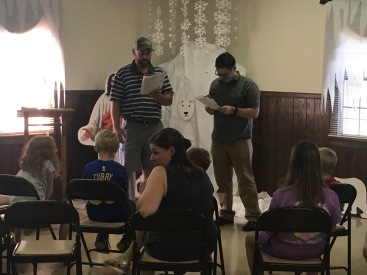It’s a compliment that I hate to get. Since I began the ministry I’ve had this sentiment expressed to me a handful of times in a variety of ways, a variety of phrasings, but they all come down to the same meaning. They are always intended as compliments, fully given with utmost sincerity and kindness, but that doesn’t mean I hate it any less. Of the times this compliment has been paid to me, one stands out in my memory as particularly blunt, especially despicable. It was early on at my first appointment, and a church member approached me after a worship service and said, “Pastor, you’re too good a preacher to stay here long.”
I hate that.
Like everyone else, I love being told that I am good at something I enjoy doing. By all means, if your pastor is a good preacher, tell her, tell him, don’t keep that to yourself out of fear of giving them a swelled head; I promise you, there are enough detractors in your pastor’s life to keep your pastor humble. I love a good compliment; it can make my day.
What I hate in the above compliment, in all its derivatives, is that it elevates me while putting down what I love.
See, I love the church. I love my home churches, where I grew up. I love my first appointment, Mt. Tirzah in Timberlake. I love where I am now, Center in Sanford. And when you tell me that I’m too good to stay here long, what you are saying is that this church does not deserve good things.

When I was graduating seminary and getting ready to leave Mt. Tirzah for Center[1], more than one person congratulated me with the words, “You’re off for bigger and better things.” What was typically meant by that is that I would be at a larger church, attended by more people, and getting paid more. But why are those the merits by which we judge success? Why is a larger congregation better than a smaller one? Why are churches with multiple services and a flock of staff members better than part-time charges with a pastor so dedicated that he or she is willing to serve while working another job? Why do we measure how good a pastor is with a paycheck?
Brothers and sisters, hear me on this: if you are at a church that loves God and loves their neighbor; if you are at a church that is attended by disciples who want to make more disciples even if they are unsure how; if you are at a church that declares the Gospel of Jesus Christ, there is no bigger or better thing.
An overwhelming number of churches in the US are small to mid-size. Approximately 94% of churches in the US have less than 500 regular worshippers, while less than 0.5% have over 2000 regular worshippers.[2] Yet when we consider what a thriving church is, we look to these megachurches. When we consider who are the best pastors in the land, we turn to these megachurches. Is it possible that the Church is so overwhelmingly bad at its job that only 0.5% can get it right? Is it possible that pastors are so overwhelmingly bad at being faithful to their calling that only 0.5% get it right?
No.
I believe that the Kingdom of God is built up through the faithful witness of all faithful followers of Jesus Christ, no matter the size of the congregation, the building, the budget or the paycheck. I believe there has never been and there never will be an organization that does as much good in the lives of human beings than the local church, and most of those local churches do not only have less than 500 regular worshipers, most of them have less than 200, and quite a few have less than 100.
This takes me back to the compliment I hate so much. When you tell me that a pastor can be too good a preacher to stay at your church, you are telling me that you are not good enough. You are telling me that your church is incapable of doing good, of being good in this world. You are telling me that your church does not matter, that your church is not important, that God cannot use your church.
Brothers and sisters, that is wrong.
Brandon J. O’Brien writes,
“The single greatest problem with small churches is perception. Low attendance, small budgets, and limited staff are not, in and of themselves, problematic. What is problematic are the insecurities and defensiveness that result when we fail to live up to expectations of success established by a handful of churches.”[3]
I pray that my church will grow. And every time I pray for this, I confess to God, “Lord, I want this church to grow in ways that will be noticeable, in ways that will benefit me, in ways that will build up my ego and reputation. Take that desire away from me. Instead, help us to grow as you understand growth, whatever that looks like, even if it is not something I will ever be able to report to the Bishop or the Conference.”
We must repent from our narrative of numerative, measurable success, and instead celebrate the myriad mustard seeds that God is daily growing in His Kingdom. God’s little church goes a long way.
[1] Being a United Methodist, I serve under appointment. Mt. Tirzah was a student-pastor appointment, and I was no longer a student. I did not choose to leave Mt. Tirzah for Center; rather, my appointment was changed from student to full time pastor.
[2] O’Brien, Brandon J. The Strategically Small Church. Bethany House. Minneapolis. 25.
[3] Ibid. 36.







There are denominations that intentionally birth a new congregation once they exceed a certain size. I can see merits to that, although I don’t belong to such a congregation. I do agree with you that “You are too good to stay here” is a flawed statement. Better to simply and truthfully say, “I love the way you explain the Gospel (or challenge us to grow in the faith, or whatever).”
LikeLike
I’ve known people who have belonged to such congregations. I remember one story a missionary told me of her uncle being selected to move and start a new congregation and having to sale all his cattle and land… three times. It would take a lot of faith and commitment to do that.
LikeLike
i have said that all along it always looks good on the other side but small churchs are like family robert harris
LikeLike
I always loved the smaller churches because I was more involved and I had a sense of the family of God and loving your neighbors more so than at a larger or mega church. I’ve always told Jess how you are so good at preaching the Gospel.
LikeLike